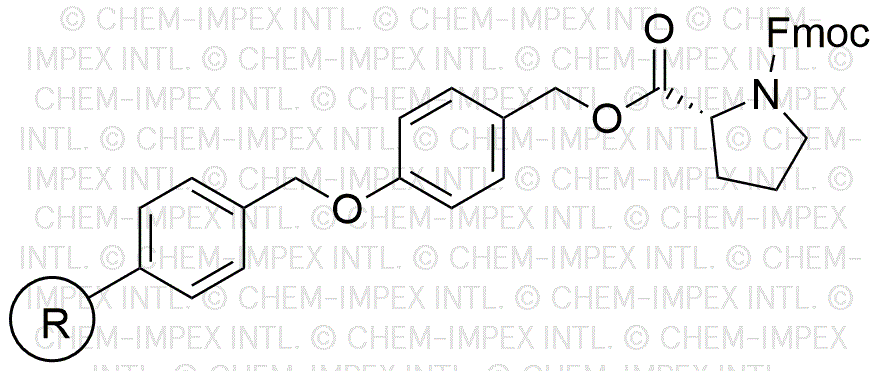Fmoc-D-proline 4-alkoxybenzyl alcohol resin is widely utilized in research focused on:
- Peptide Synthesis: This resin serves as a solid support for the synthesis of peptides, allowing for efficient coupling reactions and easy cleavage of the final product.
- Drug Development: Its application in drug discovery helps in the creation of peptide-based therapeutics, which can target specific biological pathways effectively.
- Bioconjugation: The resin can be used to attach biomolecules, such as antibodies or enzymes, to peptides, enhancing their functionality in various applications.
- Research in Neuroscience: It aids in the synthesis of neuropeptides, which are crucial for understanding brain function and developing treatments for neurological disorders.
- Customizable Peptide Libraries: Researchers can create diverse libraries of peptides for screening purposes, facilitating the discovery of new bioactive compounds.
General Information
Properties
Safety and Regulations
Applications
Fmoc-D-proline 4-alkoxybenzyl alcohol resin is widely utilized in research focused on:
- Peptide Synthesis: This resin serves as a solid support for the synthesis of peptides, allowing for efficient coupling reactions and easy cleavage of the final product.
- Drug Development: Its application in drug discovery helps in the creation of peptide-based therapeutics, which can target specific biological pathways effectively.
- Bioconjugation: The resin can be used to attach biomolecules, such as antibodies or enzymes, to peptides, enhancing their functionality in various applications.
- Research in Neuroscience: It aids in the synthesis of neuropeptides, which are crucial for understanding brain function and developing treatments for neurological disorders.
- Customizable Peptide Libraries: Researchers can create diverse libraries of peptides for screening purposes, facilitating the discovery of new bioactive compounds.
Documents
Safety Data Sheets (SDS)
The SDS provides comprehensive safety information on handling, storage, and disposal of the product.
Product Specification (PS)
The PS provides a comprehensive breakdown of the product’s properties, including chemical composition, physical state, purity, and storage requirements. It also details acceptable quality ranges and the product's intended applications.
Certificates of Analysis (COA)
Search for Certificates of Analysis (COA) by entering the products Lot Number. Lot and Batch Numbers can be found on a product’s label following the words ‘Lot’ or ‘Batch’.
*Catalog Number
*Lot Number
Certificates Of Origin (COO)
This COO confirms the country where the product was manufactured, and also details the materials and components used in it and whether it is derived from natural, synthetic, or other specific sources. This certificate may be required for customs, trade, and regulatory compliance.
*Catalog Number
*Lot Number
Safety Data Sheets (SDS)
The SDS provides comprehensive safety information on handling, storage, and disposal of the product.
DownloadProduct Specification (PS)
The PS provides a comprehensive breakdown of the product’s properties, including chemical composition, physical state, purity, and storage requirements. It also details acceptable quality ranges and the product's intended applications.
DownloadCertificates of Analysis (COA)
Search for Certificates of Analysis (COA) by entering the products Lot Number. Lot and Batch Numbers can be found on a product’s label following the words ‘Lot’ or ‘Batch’.
*Catalog Number
*Lot Number
Certificates Of Origin (COO)
This COO confirms the country where the product was manufactured, and also details the materials and components used in it and whether it is derived from natural, synthetic, or other specific sources. This certificate may be required for customs, trade, and regulatory compliance.

